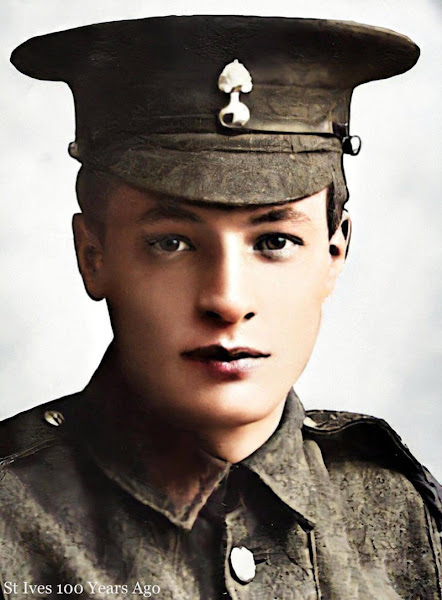Robert Kiddle
Born at St Ives 1895, Robert was the eldest son of six children born to Edward, a self employed cabinet maker and upholster, and Eleanor (née Stevens). In 1901 the family lived at at Carlisle Terrace, St Ives. The family must have been comfortably off since they had a live-in domestic servant. In 1911 Robert was employed as an apprentice upholster, lodging in Tottenham, London, with the Morrish family.
Robert's father was honorary secretary of the St Ives Choral Society. The Hunts Post published details on 4 April 1913 of a production of 'King Olaf' in which he was involved, staged in St Ives Corn Exchange.
Robert enlisted with the 1st/7th (City of London) Battalion, London Regiment, and was promoted to Sergeant. He landed in France on 18 March 1915. Robert fought through the Battle of Festubert, in which British casualties of more than 16,000 were three times those of the Germans. A some point he was injured, but able to return to his Regiment.
On Saturday 25 September 1915 the Battle of Loos was launched. It was the first use of poison gas by the British forces in an attempt to break through the German defences. A shortage of shells meant the initial bombardment, essential for damaging the German's barbed wire defences, was insufficient.
About 140 tons of chlorine gas was released with mixed success. In places the gas was blown back into British trenches. Although primitive flannel gas masks were issued to British soldiers, many removed them since they couldn't see through the fogged-up eyepieces or barely breath with them on. Some soldiers, including those in Robert's Regiment, were gassed.
Advancing over open fields at walking pace, within range of German machine guns and artillery, British losses were devastating. Robert was one of those killed on the first day of battle, Saturday 25 September 1915, aged 20yrs.
 |
| British soldiers advance into poison chlorine gas at the Battle of Loos. |
The family learned of Robert's death in a letter sent to his mother by a friend at the Front. Included with the letter was one of the letter's from Robert's mother and a photo of Robert's grandmother. The friend had been with Robert when he died and had recovered the items from his pockets. His body was lost in the turmoil of battle. Fighting was so fierce that of the 8,500 British soldiers killed on that first day, 6,500 of the bodies were never recovered. The Hunts Post reported Robert's death on 8 October 1915. Robert is commemorated on Loos Memorial, France, Fenstanton War Memorial, on a plaque in St Ives Methodist Church and on a memorial in St Ives Parish Church.
As a married man, Robert's father clearly felt strongly about being sent to War whilst many single St Ives men had yet to volunteer. He had a letter published in the Hunts Post on 6 August 1915 as he sailed for Gallipoli aboard HMT Royal Edward. Sailing unescorted, the ship was hit by a German U boat torpedo off the island of Kandeloussa and sunk within six minutes. The death toll was more than half the crew and passengers, a total of 864. Robert's father was fortunate, being one of the 661 rescued over a period of six hours. The Hunts Post published the good news of his rescue on 20 August 1915.
 |
| Robert Kiddle seated, with brothers Charles & Vincent, 1914. |
In additional to his father, three of Robert's brothers also served in the War. The Hunts Post published their names on 24 September 1915, and printed photographs of all five on 26 November 1915.
Do you have any additional information about Robert? If so, please get in touch via the make contact page.
To read about St Ives in WWI and of all the St Ives men who died, click St Ives in World War I.
Source materials
Click any of the links below to view original source materials.



No comments:
Post a Comment